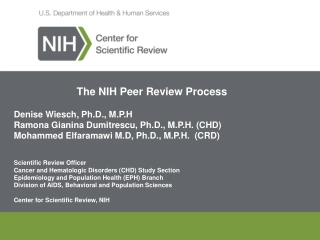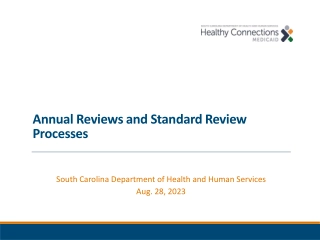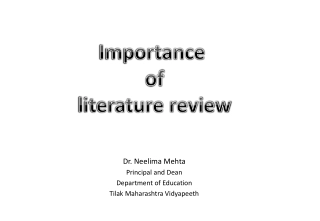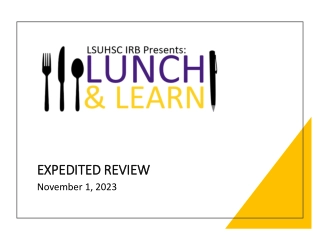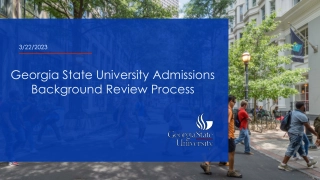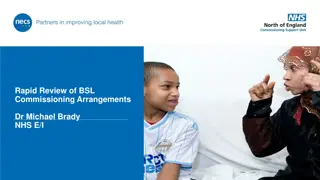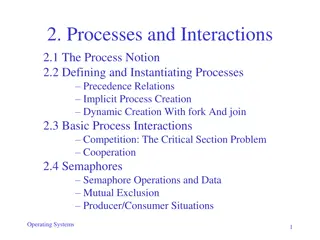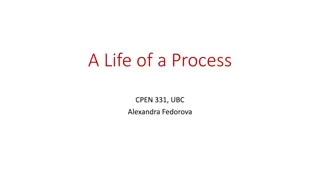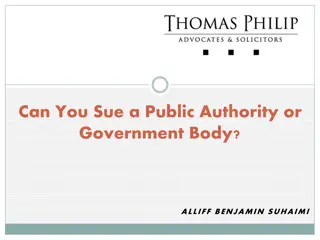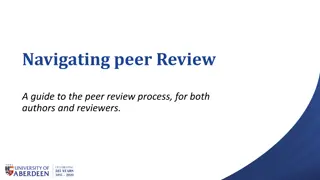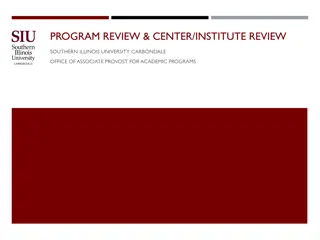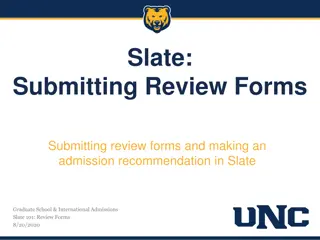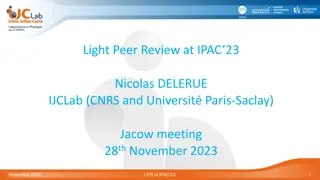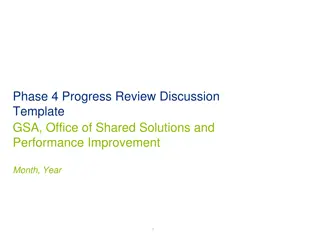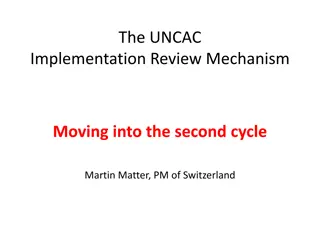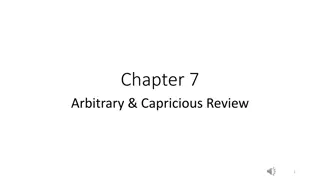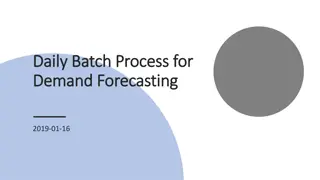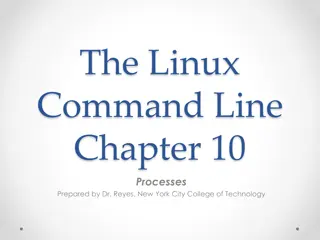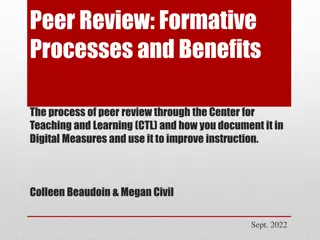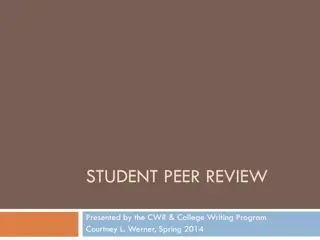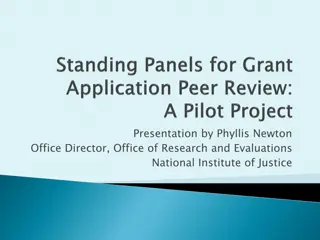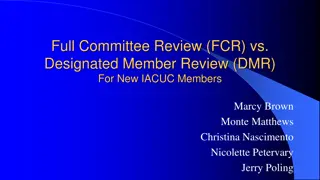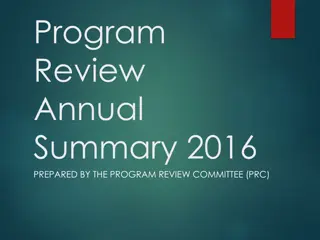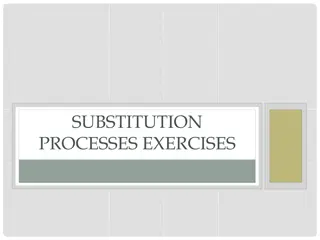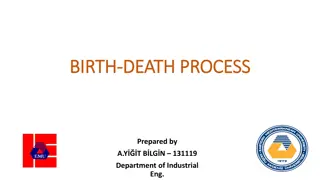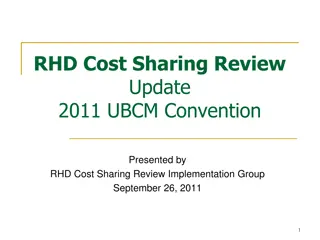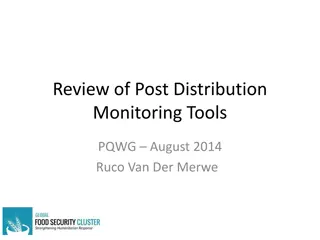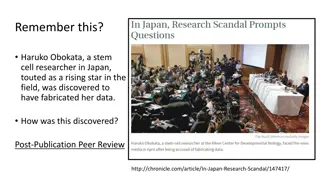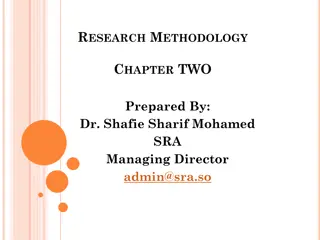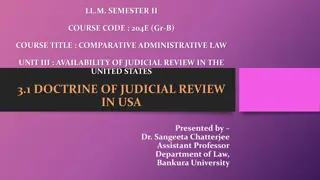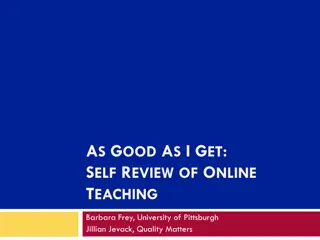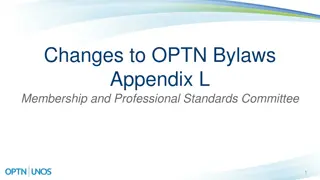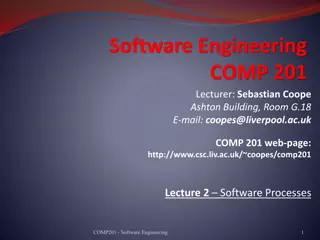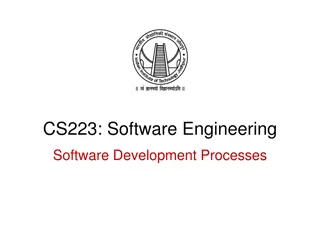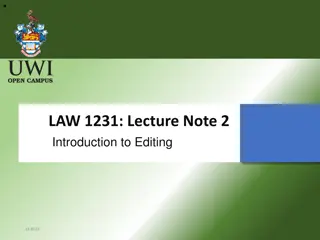The NIH Peer Review Process
The NIH Peer Review Process, including the role of the Center for Scientific Review (CSR) in receiving, referring, and reviewing grant applications. Understand how applications are assigned to institutes or centers and the importance of scientific and technical merit in the review process.
1 views • 18 slides
Annual Reviews and Standard Review Processes
The annual review and standard review processes implemented by the South Carolina Department of Health and Human Services. Stay informed about agency goals, PHE updates and activities, the annual review cycle, the 90-day grace period, and self-service tools available.
4 views • 11 slides
Simplified Review Framework
Simplified review framework for peer review criteria in research project grants, aimed at improving the evaluation process for peer reviewers. The framework will address concerns raised by the extramural community regarding increased complexity and administrative burden in NIH's peer review criteria
1 views • 20 slides
Importance of literature review
A literature review is a critical component of any research endeavor, providing a comprehensive analysis of existing knowledge in a particular field. This review helps in clarifying conceptual issues, understanding research design, persuading examiners, and contributing new insights to the subject a
0 views • 28 slides
Understanding IRB Review Process for Expedited Research
Learn about the significance of IRB review, levels of review, and categories of expedited review. Discover the criteria for IRB review, including whether the study involves human subjects and contributes to generalizable knowledge. Explore the different levels of IRB review and the specific categori
4 views • 11 slides
Georgia State University Admissions Background Review Process
Georgia State University conducts a comprehensive Admissions Background Review (ABR) process to assess applicants' admissibility based on reported information and potential threats to the campus. The ABR Committee evaluates responses to specific admissions background questions, referring cases invol
1 views • 11 slides
Understanding IRB Review Process for Research Studies
The content provides an overview of the IRB review process for research studies, including what necessitates IRB review, the levels of IRB review (exempt, expedited, full board), examples of full board research, and criteria for an Investigational New Drug.
1 views • 17 slides
Rapid Review of BSL Commissioning Arrangements by Dr. Michael Brady
NECS commissioned a Rapid Review of British Sign Language (BSL) service provision to identify areas for improvement in access and patient experience, especially during the Covid-19 pandemic. The review focused on stakeholder engagement, options appraisal for commissioning responsibility, and recomme
9 views • 19 slides
Processes and Interactions
Processes in operating systems involve executing programs on CPUs, with each process having its own CPU. Processes run concurrently and can cooperate or compete for resources. Defining, creating, and managing processes is crucial for system efficiency and performance. Precedence relations, semaphore
1 views • 38 slides
A Life of a Process
This content delves into the creation and management of processes in operating systems, covering concepts such as forking processes, process states, address space management, copying processes, and key functions involved in process handling. It provides insights on constructing processes from scratc
0 views • 35 slides
Understanding Judicial Review in Suing Public Authorities
Judicial review is the inherent right of courts to review decision-making processes of public bodies. It allows for challenging and analyzing decisions, granting public law remedies like declaration, certiorari, mandamus, prohibition, and quo warranto. Those adversely affected by public duty actions
0 views • 13 slides
Navigating Peer Review: A Comprehensive Guide for Authors and Reviewers
In academic publishing, peer review plays a crucial role in maintaining publication quality. This guide offers a detailed overview of the peer review process for both authors and reviewers, covering topics such as receiving review invitations, manuscript submission, writing effective reviews, and mo
0 views • 31 slides
Southern Illinois University Carbondale Office of Associate Provost for Academic Programs Review
The Program Review & Center/Institute Review at Southern Illinois University Carbondale aims to educate attendees on IBHE requirements, the review process, conflict of interest policies, self-study writing, on-site review involvement, financial support, and available resources. The IBHE mandates rev
0 views • 37 slides
Slate Graduate School & International Admissions Review Forms Overview
Explore the process of submitting review forms and making admission recommendations in Slate Graduate School & International Admissions, including automatic assignment of applications to queues, review of Staff Review Forms, and recommending admission or denial through Faculty Review Forms. Learn ab
0 views • 8 slides
Light Peer Review at IPAC'23 Organized by IN2P3: Details and Guidelines
Light Peer Review (LPR) at IPAC'23 organized by IN2P3 aims to enhance the academic reputation of accelerator research, train students in peer-review processes, and elevate the impact factor of publications. The event has strict acceptance criteria ensuring the quality and originality of the work, wi
0 views • 22 slides
Phase 4 Progress Review Discussion Template Overview
This template guides a Progress Review discussion involving a Customer, Provider, and Key Stakeholders. It addresses the gaps in common business requirements, risk assessment confidence, deployment readiness, budget impacts, migration costs, and more. The template provides instructions for completin
0 views • 25 slides
Understanding Judicial Review in Administrative Law
In this chapter, the concept of judicial review in administrative law is explored, focusing on the scope of review set by Congress, including trial de novo and independent judgment on evidence. Different standards of review, such as clearly erroneous and substantial evidence, are discussed, highligh
0 views • 23 slides
UNCAC Implementation Review Mechanism: Moving Towards the Second Cycle
The UNCAC Implementation Review Mechanism is progressing into its second cycle, with a focus on evaluating challenges and terms of reference at the conclusion of each review cycle. The performance assessment has highlighted achievements in enhancing awareness and involvement of civil society/private
0 views • 7 slides
Understanding Arbitrary and Capricious Review in Administrative Law
Arbitrary and Capricious Review refers to a highly deferential standard applied to agency decisions, requiring agencies to demonstrate compliance with statutory requirements. The landmark case of Citizens to Preserve Overton Park v. Volpe set the precedent for a thorough judicial review based on the
0 views • 8 slides
Daily Batch Process for Demand Forecasting - Roadmap and Import Actions
In this data workflow, a roadmap is prepared for batch processes related to demand forecasting. It includes steps for uploading and importing data into Anaplan, SQL sources, EBS processes, and various file imports. The script names and processes are outlined with caution against renaming data hub pr
0 views • 14 slides
Understanding Programs and Processes in Operating Systems
Exploring the fundamental concepts of programs and processes in operating systems, this content delves into the definitions of programs and processes, the relationship between them, the components of a program, what is added by a process, and how processes are created. The role of DLLs, mapped files
0 views • 22 slides
Understanding Linux Processes and Controlling Them
This content provides insights into Linux processes, including parent-child relationships, process management commands like ps and top, background jobs, bringing processes to the foreground, and terminating processes. It also covers killing processes using kill and killall commands.
0 views • 7 slides
Enhancing Teaching Through CTL Peer Review Process
Explore the formative processes and benefits of peer review at the Center for Teaching and Learning (CTL). The article delves into the voluntary nature of peer review at UT, outlining its three components and the step-by-step process from pre-observation to post-observation conferences. Discover how
0 views • 21 slides
Global Peer Review Activities and Future Plans Overview
This document highlights the recent peer review activities conducted by the Subcommittee on Peer Review, focusing on the accomplishments and upcoming plans for enhancing peer review processes. It includes insights from the Global Flyer Survey, training programs, and the development of guidelines, al
0 views • 3 slides
Enhancing Peer Review Practices in College Writing Programs
Explore the significance of peer review in college writing instruction, emphasizing the practicality, foundational pedagogies from the 1970s-1990s, and strategies to improve peer review processes. Learn how to set a foundation, make peer reviews more social using writing groups and online platforms,
0 views • 5 slides
Enhancing Scientific Review Processes in Research: Insights from the National Institute of Justice
Phyllis Newton, Office Director at the National Institute of Justice, presents strategies for stronger, transparent, diverse, and efficient scientific reviews. The presentation covers annual review challenges, pilot projects, panel models, merit review processes, and funding decisions.
0 views • 14 slides
Understanding Full Committee Review (FCR) vs. Designated Member Review (DMR) for New IACUC Members
Explore the differences between Full Committee Review (FCR) and Designated Member Review (DMR) for new IACUC members. Learn the acceptable methods of protocol review, federal requirements, member responsibilities, risks, and best practices for protocol approval. Dive into the two valid methods of IA
1 views • 23 slides
Program Review Annual Summary 2016 by PRC Committee
The Program Review Annual Summary 2016, prepared by the Program Review Committee (PRC), presents a detailed review of instructional programs and administrative units at the College. The report outlines the purpose of the annual review, the themes and issues identified, and recommendations for improv
0 views • 13 slides
Phonetic Processes Exercises for Linguistics Students
Practice identifying phonetic processes such as stridency deletion, stopping, fronting, and more with exercises involving target words. Determine which processes apply to various words and mark the likely processes for specific targets. Enhance your understanding of substitution processes in linguis
0 views • 5 slides
Pure Birth Processes in Industrial Engineering
Birth-death processes, Yule-Furry models, and pure birth processes are discussed in the context of industrial engineering. The study of evolutionary processes, population dynamics, and radioactive transmutations are explored through mathematical models and examples. The concept of state transitions
0 views • 19 slides
RHD Cost Sharing Review Update 2011 - UBCM Convention Insights
Background review of the RHD Cost Sharing Review's 2008 report, progress updates from 2009 & 2010 Conventions, and actionable recommendations from the 2008 Cost Sharing Review. Recommendations include long-range capital planning, fixed funding amounts definition, P3 educational materials development
0 views • 27 slides
Review of Post-Distribution Monitoring Tools - Analysis and Insights
This review analyzes existing post-distribution monitoring tools and methodologies used by various partners, highlighting common themes and challenges. It discusses the need for a common monitoring template and methodological guidance to streamline processes. Key findings include variations in monit
0 views • 10 slides
Uncovering Fabricated Data in Stem Cell Research: The Haruko Obokata Scandal
Haruko Obokata, a promising stem cell researcher in Japan, faced allegations of data fabrication, leading to a significant research scandal. Post-publication peer review platforms like PubPeer, PubMed Commons, F1000 Research, and ResearchGate Open Review play vital roles in detecting and addressing
0 views • 11 slides
Effective Strategies for Conducting a Literature Review in Research Methodology
Understanding the importance of literature review in research methodology, this chapter discusses the objectives, aims, and guidelines for writing a comprehensive literature review. It emphasizes the significance of identifying gaps in existing knowledge, structuring the review, and organizing infor
0 views • 33 slides
Understanding the Doctrine of Judicial Review in the United States
Judicial Review is a crucial power of the judiciary to review the constitutionality of laws and executive orders. This article explores the origin of Judicial Review in the United States, focusing on the landmark case of Marbury v. Madison. It delves into the concept, importance, and application of
0 views • 14 slides
Enhancing Online Teaching Through Self-Review: Challenges and Benefits
Explore the self-review process of online teaching, including identifying challenges, benefits, and different types of reviews. Learn about developing an effective review guide, promoting collegiality, and facilitating professional development in online teaching. Discover the components of a review
0 views • 23 slides
Proposed Changes to OPTN Bylaws: Enhancing Membership and Professional Standards Committee Processes
Proposal aims to address limitations in review processes by allowing more flexibility, detailed reviews, and clarity for members going through review stages. It includes informal discussions, interviews, hearings, and rights improvements for members under review, ultimately focusing on patient healt
0 views • 16 slides
Understanding Software Engineering Processes
Dive into the world of software engineering processes through a comprehensive exploration of building development processes, tasks involved, and the characteristics of a process. Discover how these processes ensure systematic software development and the key steps required for successful project com
0 views • 33 slides
Understanding Software Engineering and Development Processes
Explore the key concepts of software engineering, including misconceptions, legacy software, and development phases. Learn about professional responsibilities, the need for software processes, the ETVX model, and different properties of software processes. Discover the components of software process
0 views • 57 slides
Peer Review Process in Academic Editing
Explore the importance of peer review in academic and professional development, focusing on improving writing skills and critical evaluation. Learn about the benefits of peer review, ways to effectively review work, and various modes of assessment. Understand the peer review process and how it enhan
0 views • 29 slides
